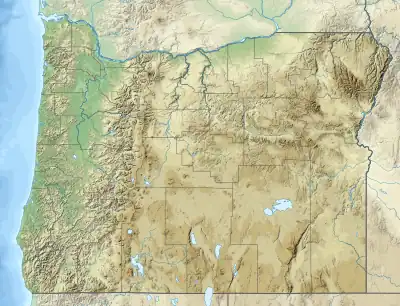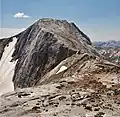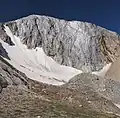Matterhorn (Oregon)
Matterhorn is a 9,835-foot elevation (2,998 m) mountain summit located in Wallowa County, Oregon, US.
| Matterhorn | |
|---|---|
.jpg.webp) Northwest aspect of Matterhorn | |
| Highest point | |
| Elevation | 9,835 ft (2,998 m)[1] |
| Prominence | 333 ft (101 m)[2] |
| Parent peak | Sacajawea Peak (9,838 ft)[3] |
| Isolation | 1.25 mi (2.01 km)[3] |
| Coordinates | 45°13′44″N 117°17′52″W[4] |
| Geography | |
 Matterhorn Location in Oregon  Matterhorn Matterhorn (the United States) | |
| Location | Eagle Cap Wilderness |
| Country | United States of America |
| State | Oregon |
| County | Wallowa |
| Parent range | Wallowa Mountains |
| Topo map | USGS Eagle Cap |
| Geology | |
| Type of rock | limestone |
| Climbing | |
| Easiest route | class 2[3] hiking via Ice Lake[1] |
Description
Matterhorn is located 10 miles south-southwest of Joseph, Oregon, in the Wallowa Mountains. It is set within the Eagle Cap Wilderness on land managed by Wallowa–Whitman National Forest.[2] The peak is situated 1.8 mile west-northwest of Craig Mountain, 1.5 mile west of Ice Lake and 1.24 mile south of line parent Sacajawea Peak. The peak ranks as the second-highest peak in the Wallowa Mountains,[1] and the seventh-highest summit in Oregon.[3] It was once considered to be the highest in the Wallowas, before Sacajawea Peak was determined to be a few feet higher.[5] Precipitation runoff from the mountain drains west into Hurricane Creek and east into Adam Creek, both of which are tributaries of the Wallowa River. Topographic relief is significant as the summit rises over 3,200 feet (980 meters) above Hurricane Creek in less than one mile. The peak is composed of limestone of the Martin Bridge Formation.[1] This landform's toponym has been officially adopted by the United States Board on Geographic Names.[4] It is so named because of a likeness to the famous Matterhorn on the Swiss–Italian border, and the name has been in use since at least 1926.[6]
Climate
Based on the Köppen climate classification, Matterhorn is located in a subarctic climate zone characterized by long, usually very cold winters, and mild summers.[7] Winter temperatures can drop below −10 °F with wind chill factors below −20 °F. Most precipitation in the area is caused by orographic lift. Thunderstorms are common in the summer.[1]
Gallery
See also
References
- Fred Barstad (2021), Hiking Oregon's Eagle Cap Wilderness, Falcon Guides, ISBN 9781493043774, p. 364
- "Matterhorn, Oregon". Peakbagger.com. Retrieved 2022-10-06.
- "Matterhorn - 9,826' OR". listsofjohn.com. Retrieved 2022-10-06.
- "Matterhorn". Geographic Names Information System. United States Geological Survey, United States Department of the Interior. Retrieved 2022-10-06.
- Wallowa-Whitman National Forest (N.F.), Wallowa Valley Unit Resource Allocation Environmental Impact Statement, (1975), United States Forest Service, p. 2
- Frederic George Young, "Oregon Historical Quarterly" Volume 27, (1926), p. 418
- Peel, M. C.; Finlayson, B. L.; McMahon, T. A. (2007). "Updated world map of the Köppen−Geiger climate classification". Hydrol. Earth Syst. Sci. 11: 1633–1644. ISSN 1027-5606.
External links
- Weather forecast: Matterhorn
- Matterhorn (photo): Flickr


.jpg.webp)

.jpg.webp)